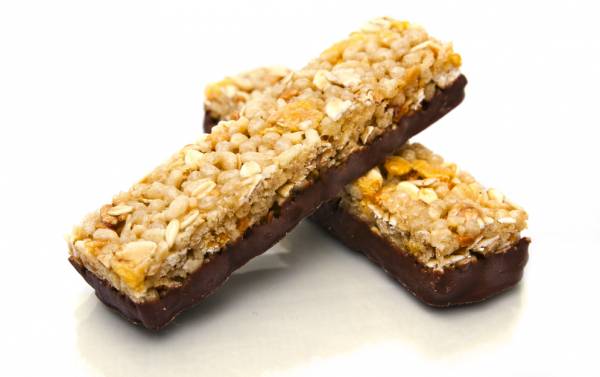For years I’ve chowed down on energy bars like they were going out of style. While these bars are satisfying and tasty, I can’t help but wonder if I’m really eating something truly healthy.
Part of our practice as fitness professionals is setting an example for our clients, as well as helping to consult them on proper nutrition. Many in our industry are quick to seize the economic opportunity of selling customers news they want to hear. “You can have your cake and eat it, too” is a message that all too many are willing to share. In my opinion, energy bars are part of that paradigm.
As a coach, it’s not always easy giving clients hard truths. It can be a tough sell to tell customers that hard work equals results. However, we know this to be an absolute truth whether in the weight room or on the field of play. When it comes to the food we use to reach our goals, “Eat your vegetables” is an even harder sell. It’s here where the waters can get a little murky.
Bars “Work,” But Are They Healthy?
Many of us in fitness rely on energy bars as a source of fuel, both personally and professionally. We eat bars to energize our workouts or as meal replacements and we sell our clients the same bill of goods. Indeed, energy bars can be effective. They provide quick and convenient fuel when we need it. Lord knows I have eaten hundreds, if not thousands, over the past twenty years. They most certainly help me get through the day, my workouts, and long bike rides. They usually taste good, too.
But the question is not, “Do energy bars work?” The question is, “Are they good for us?” There is a subtle but important distinction here. Our job in fitness is to provide results, but it is my contention that our job in fitness is not merely to sell what “works,” but more so what is truthful and ultimately healthy.
What Do the Experts Say?
The father of Western medicine, Hippocrates, suggested we should let food be our medicine. In essence, he was of the opinion that the foundation for health and wellness starts with what we eat. Many modern food experts, from Michael Pollan to Andrew Weil, are saying the same thing – food is our medicine and we as a collective society are failing miserably. The problem, in short, is packaged and processed food.
The Problem With Energy Bars
In his excellent book, Fat Chance, Dr. Robert Lustig conclusively showed that the real culprit in the obesity epidemic is sugar. Nothing has brought sugar into the mainstream American diet faster than processed and packaged foods. Energy bars, with certain notable exceptions, are part of this construct, usually containing an abundance of added sugar.

With this added sugar your body raises blood sugar and insulin levels rapidly. In doing so, your body becomes more insulin resistant, which leads to weight gain. Studies show that when we eat sugar-laden processed foods the insulin response is higher. One study showed than when eating processed food compared to whole foods with the same macronutrient profile the insulin response was up to 70% higher.
It doesn’t stop there. Sugar doesn’t just lead to weight gain, it also adversely affects our health. In Fat Chance, Lustig pointed out that while obesity is correlated to sickness, it isn’t the cause. You can still be or look fit, and also be sick.
Real Foods Are Better
Real food takes longer for our bodies to metabolize and we burn more calories in the process – that’s a good thing. According to a recent food study, it was concluded that it takes us 50% longer to digest real whole food than processed food. By requiring more digestive time our body burns more calories. Not only do our bodies burn significantly more calories in this longer thermic effect, our body also metabolizes more enzymes and micronutrients in the process as well.
Studies also suggest that eating real food affects our mood in positive ways. Two studies in the British Journal of Psychiatry showed that eating a whole foods diet with vegetables, fruit, meat, fish, and whole grains is linked to less depression than a typical Western diet of processed foods. Is it really surprising or shocking that eating real foods can make us healthier and even happier?
Food, Philosophically Speaking
When it comes right down to it, energy bars are part of the problem, not the solution. They certainly aren’t bad for us in a performance capacity. In fact, some can even help us with our short-term performance goals. Furthermore, eating energy bars isn’t going to cause us to keel over. Rather, energy bars are bad for us because they send the wrong message. That message is that processed and packaged foods can be healthy and part of the solution for what ails us.

Bars are simply a healthier alternative of packaged food. In that way, they are a bit like electronic cigarettes – a distraction from the act that smoking is bad for us. Similarly, it’s time we as a society deem that processed foods, foods that come in a box, and foods with added sugar are bad for us. We should be taking steps to limit and eliminate such foods.
I know it’s a tall order. Look, I like the convenience of packaged foods like bars, too. A bar sure hits the spot between classes or clients. On a long bike ride, a bar is sure a welcome companion. I can’t imagine hauling a ham sandwich in my jersey to eat thirty miles down the road. But as convenient and satisfying as bars are, I know they ultimately aren’t part of what I should eat. Increasingly I make sure clients see me eating raw nuts or an apple, and not a bar.
It’s time to take a stand and acknowledge that the way for our country to get healthy again is to get back in touch with eating real foods, whole foods, and raw foods the way the human body is meant to.
References:
1. Robert Lustig, Fat Chance (USA, Hudson Street Press, 2012).
2. G Oettle, M. Pauline, et al. “Glucose and Insulin Responses to Manufactured and Whole-Food Snacks.” American Journal of Clinical Nutrition (1987): 45, 86-91.
3. Barr and Wright “Post-Prandial energy expenditure in whole-food and processed-food meals; implications for daily energy expenditure,” Food & Nutrition Research (2010): 54.
4. Akbaraly, T., Brunner, E., et al. “Dietary Pattern and Depressive Symptoms in Middle Age,” British Journal of Psychiatry (2009): 195, 408-413.
Photos courtesy of Shutterstock.






